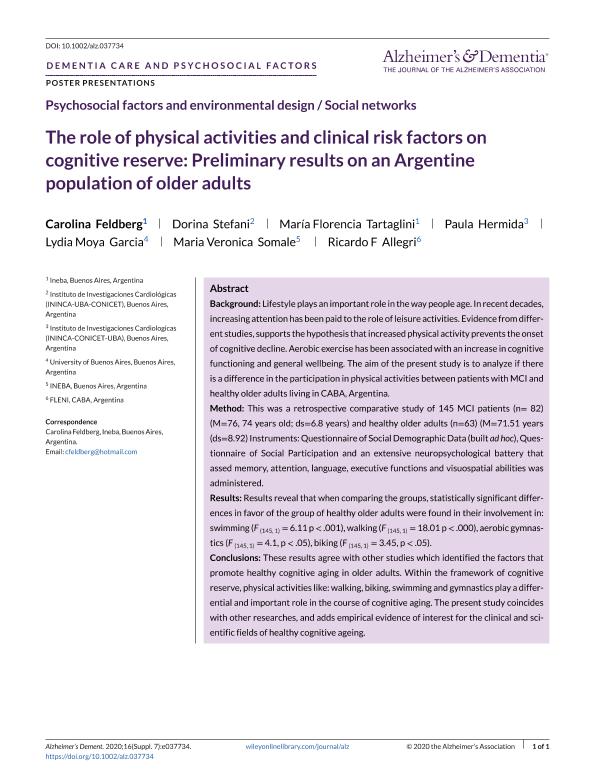Mostrar el registro sencillo del ítem
dc.contributor.author
Feldberg, Carolina

dc.contributor.author
Stefani, Dorina

dc.contributor.author
Tartaglini, Maria Florencia

dc.contributor.author
Hermida, Paula Daniela

dc.contributor.author
Moya García, Lydia

dc.contributor.author
Somale, María Verónica
dc.contributor.author
Allegri, Ricardo Francisco

dc.date.available
2021-08-20T17:58:22Z
dc.date.issued
2020
dc.identifier.citation
The role of physical activities and clinical risk factors on cognitive reserve: Preliminary results on an Argentine population of older adults; Alzheimer´s Association International Conference; Países Bajos; 2020; e037734-e037734
dc.identifier.issn
1552-5279
dc.identifier.uri
http://hdl.handle.net/11336/138646
dc.description.abstract
Background: Lifestyle plays an important role in the way people age. In recent decades, increasing attention has been paid to the role ofleisure activities. Evidence from different studies, supports the hypothesis that increased physical activity prevents the onset of cognitive decline. Aerobic exercise has been associated with an increase in cognitive functioning and general wellbeing. The aim of the present study is to analyze if there is a difference in the participation in physical activities between patients with MCI and healthy older adults living in CABA, Argentina.Method: This was a retrospective comparative study of 145 MCI patients (n= 82) (M=76, 74 years old; ds=6.8 years) and healthy older adults (n=63) (M=71.51 years (ds=8.92) Instruments: Questionnaire of Social Demographic Data (built ad hoc), Questionnaire of Social Participation and an extensive neuropsychological battery that assed memory, attention, language, executive functions and visuospatial abilities was administered.Results: Results reveal that when comparing the groups, statistically significant differences in favor of the group of healthy older adults were found in their involvement in: swimming (F(145, 1) = 6.11 p < .001), walking (F(145, 1) = 18.01 p < .000),aerobic gymnastics (F(145, 1) = 4.1, p < .05), biking (F(145, 1) = 3.45, p < .05). Conclusions: These results agree with other studies which identified the factors that promote healthy cognitive aging in older adults. Within the framework of cognitive reserve, physical activities like: walking, biking, swimming and gymnastics play a differential and important role in the course of cognitive aging. The present study coincides with other researches, and adds empirical evidence of interest for the clinical and scientific fields of healthy cognitive ageing.
dc.format
application/pdf
dc.language.iso
eng
dc.publisher
Wiley

dc.rights
info:eu-repo/semantics/openAccess
dc.rights.uri
https://creativecommons.org/licenses/by-nc-sa/2.5/ar/
dc.subject
Aging
dc.subject
Cognition
dc.subject
Physical activity
dc.subject.classification
Otras Psicología

dc.subject.classification
Psicología

dc.subject.classification
CIENCIAS SOCIALES

dc.title
The role of physical activities and clinical risk factors on cognitive reserve: Preliminary results on an Argentine population of older adults
dc.type
info:eu-repo/semantics/publishedVersion
dc.type
info:eu-repo/semantics/conferenceObject
dc.type
info:ar-repo/semantics/documento de conferencia
dc.date.updated
2021-08-18T20:08:09Z
dc.journal.volume
19
dc.journal.number
S7
dc.journal.pagination
e037734-e037734
dc.journal.pais
Estados Unidos

dc.description.fil
Fil: Feldberg, Carolina. Instituto de Neurociencias Buenos Aires S. A.; Argentina
dc.description.fil
Fil: Stefani, Dorina. Consejo Nacional de Investigaciones Científicas y Técnicas. Oficina de Coordinación Administrativa Houssay. Instituto de Investigaciones Cardiológicas. Universidad de Buenos Aires. Facultad de Medicina. Instituto de Investigaciones Cardiológicas; Argentina
dc.description.fil
Fil: Tartaglini, Maria Florencia. Instituto de Neurociencias Buenos Aires S. A.; Argentina. Consejo Nacional de Investigaciones Científicas y Técnicas; Argentina
dc.description.fil
Fil: Hermida, Paula Daniela. Consejo Nacional de Investigaciones Científicas y Técnicas. Oficina de Coordinación Administrativa Houssay. Instituto de Investigaciones Cardiológicas. Universidad de Buenos Aires. Facultad de Medicina. Instituto de Investigaciones Cardiológicas; Argentina
dc.description.fil
Fil: Moya García, Lydia. Instituto de Neurociencias Buenos Aires S. A.; Argentina
dc.description.fil
Fil: Somale, María Verónica. Instituto de Neurociencias Buenos Aires S. A.; Argentina
dc.description.fil
Fil: Allegri, Ricardo Francisco. Consejo Nacional de Investigaciones Científicas y Técnicas; Argentina. Fundación para la Lucha contra las Enfermedades Neurológicas de la Infancia; Argentina
dc.relation.alternativeid
info:eu-repo/semantics/altIdentifier/url/https://alz-journals.onlinelibrary.wiley.com/doi/10.1002/alz.037734
dc.relation.alternativeid
info:eu-repo/semantics/altIdentifier/doi/https://doi.org/10.1002/alz.037734
dc.conicet.rol
Autor

dc.conicet.rol
Autor

dc.conicet.rol
Autor

dc.conicet.rol
Autor

dc.conicet.rol
Autor

dc.conicet.rol
Autor

dc.coverage
Internacional
dc.type.subtype
Conferencia
dc.description.nombreEvento
Alzheimer´s Association International Conference
dc.date.evento
2020-07-27
dc.description.paisEvento
Países Bajos

dc.type.publicacion
Journal
dc.description.institucionOrganizadora
Alzheimer´s Association
dc.source.revista
Alzheimer´s & Dementia
dc.date.eventoHasta
2020-07-31
dc.type
Conferencia
Archivos asociados
